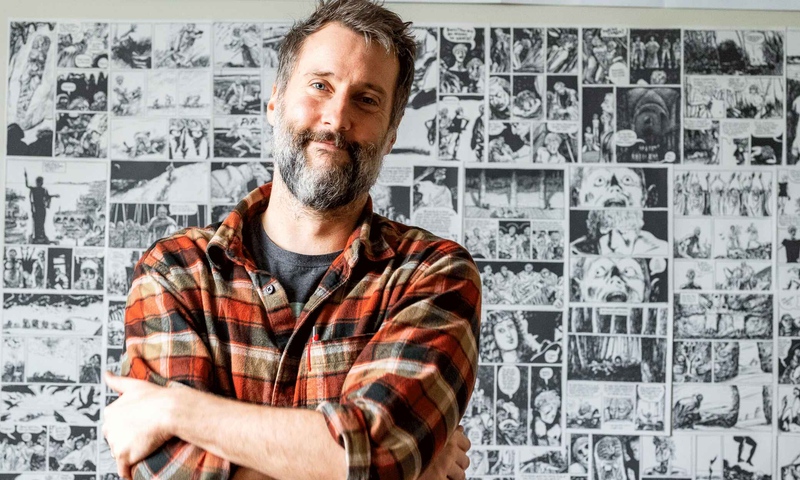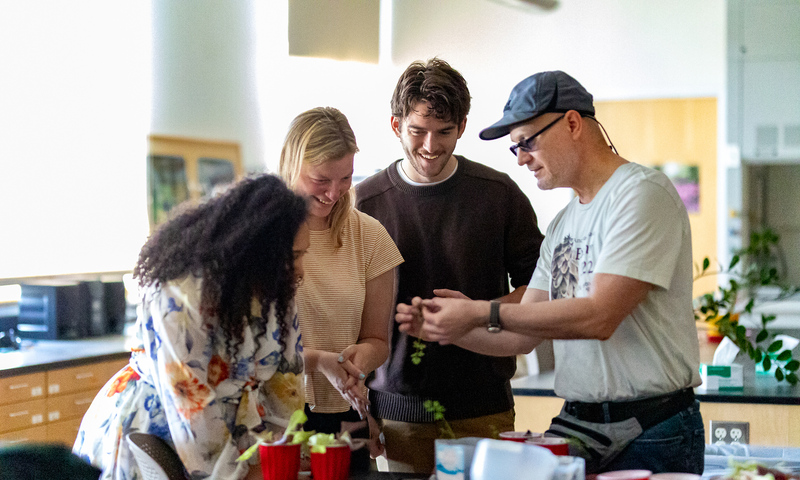Anthony Bonifonte began to relish mathematics at the ripe old age of 8, when he realized that unraveling math problems could help him destroy his friends at video and board games.
This love of numbers and probabilities and puzzles only grew with time, leading him to earn his bachelor’s degree in mathematics. As he planned for life after graduation, he reflected on which people he’d met who seemed happiest with their career choices.
“The answer was my college professors, and so I decided that I wanted to teach at a liberal arts college,” he says.
After reading a particularly inspiring academic paper about maximizing the efficiency of organ donations, he focused his graduate work on health care analytics.
The explosion of data analytics as a field opens a world of opportunity across all disciplines for Denison students who study it, says Bonifonte, an assistant professor of data analytics and global health. And a man who needs six IKEA bookcases to store his more than 200 board games is not the type to induce slumber in the classroom.
You learned to appreciate the power of math as a boy. How did that come about?
I really got into math as a youth by trying to do better at both video games and board games. I would want to beat my friends, so I would calculate probabilities and figure out what the best solution was.
You’ve carried that sense of playfulness from your childhood appreciation of games right into your teaching of advanced subjects. How do you impress upon your students that math and data don’t have to be bone-dry?
Still to this day when I’m teaching classes, I’ll use these examples. In teaching about this fancy machine-learning technique called decision trees and random forests, we play the game of Guess Who?, because it turns out the way you can solve that game is precisely the idea of a decision tree.
Students connect better with real-world data than with fabricated data sets pulled from a textbook, Anthony Bonifonte says.
In my advanced methods for data analytics class just a few weeks ago, we were playing with Legos. We were introducing a concept called optimization. I gave each student a bag with a fixed count of small bricks and large bricks and said, “You run a factory that produces furniture, and you can make these three different kinds of furniture: a chair, a step ladder, or a table that you can sell for a certain amount of profit. You only have the bricks that I’ve given you. Make as much money as you can.”
That’s a great introduction to this field of optimization but achieved in a playful way that draws you in.
I also try very hard to avoid textbook problems with a boring data set that was fabricated by whoever wrote the book for purposes of teaching the idea. We use real data sets whenever we can.
While the approach can be light, these tools are used to solve truly heavy world problems. You’ve studied how to distribute methadone more efficiently to opioid users and how to better assess high blood pressure. Why did health care analytics interest you?
It’s using math and data for improving health care, so you’re thinking about things like screening and treatment of diseases, and how we can predict the risk that somebody will have some adverse outcome.
A research paper that I found so amazing looked at kidney transplants. I might want to give a kidney to my father, who needs one, but it turns out I’m not a match. You are willing to give a kidney to your father who needs one, but you’re not a match for him. But it turns out I’m a match for your dad, and you’re a match for my dad. We can swap. But it doesn’t have to stop there. We can have bigger chains.
This felt to me like the alchemists’ search for gold. We were creating something out of nothing. That’s what my field of math does. It rearranges what we already have to do better.
A board and video game enthusiast, Anthony Bonifonte sometimes enlists his favorite games to help teach students complicated ideas in math and data analytics.
Are there board games you might recommend that, while heavy on the math, are not light on entertainment?
Sure. One is an older game that recently got re-released called RoboRally. It feels like computer programming, where you’re laying out your series of moves, and then everybody goes in real time, so inevitably your great plan gets spoiled. It’s great for laughs, but it also encourages you to think about the logical planning and the accounting for risk and others’ moves.
The second game I would say is Button Men. I’ve actually spent a good number of years thinking about strategies and calculating out all the math behind all the different strategies and the probabilities of how everything interplays.
So we shouldn’t underestimate you when it comes to board games?
(Laughs) No. No. I’ve competed in the Settlers of Catan world tournament. I didn’t get very far at all, but I’ve competed in it. So no, no.









